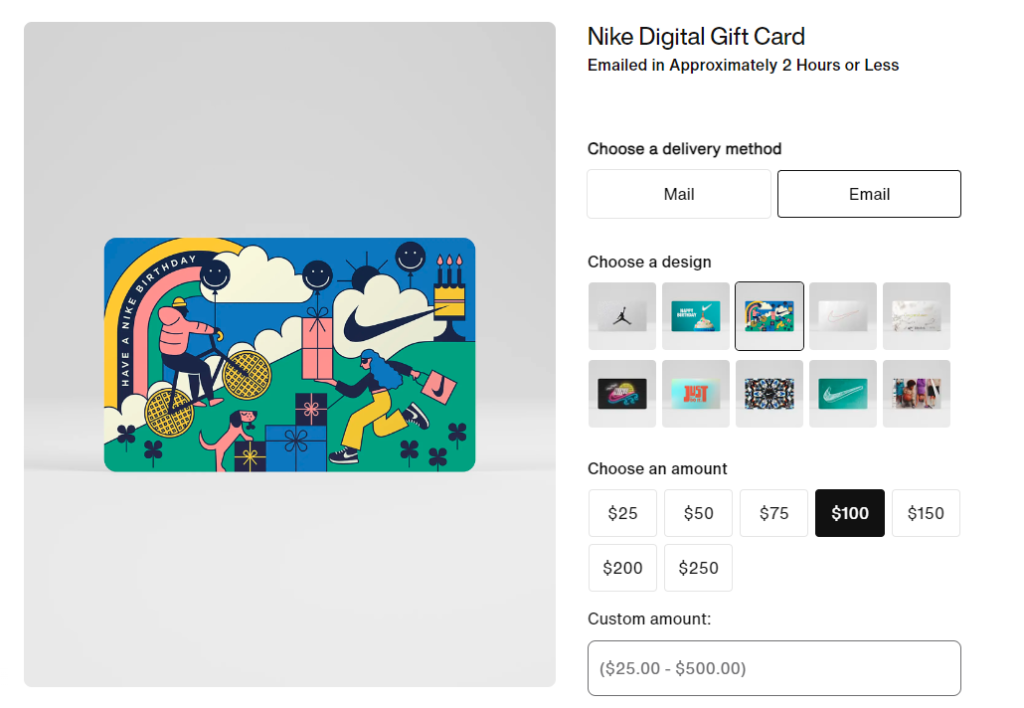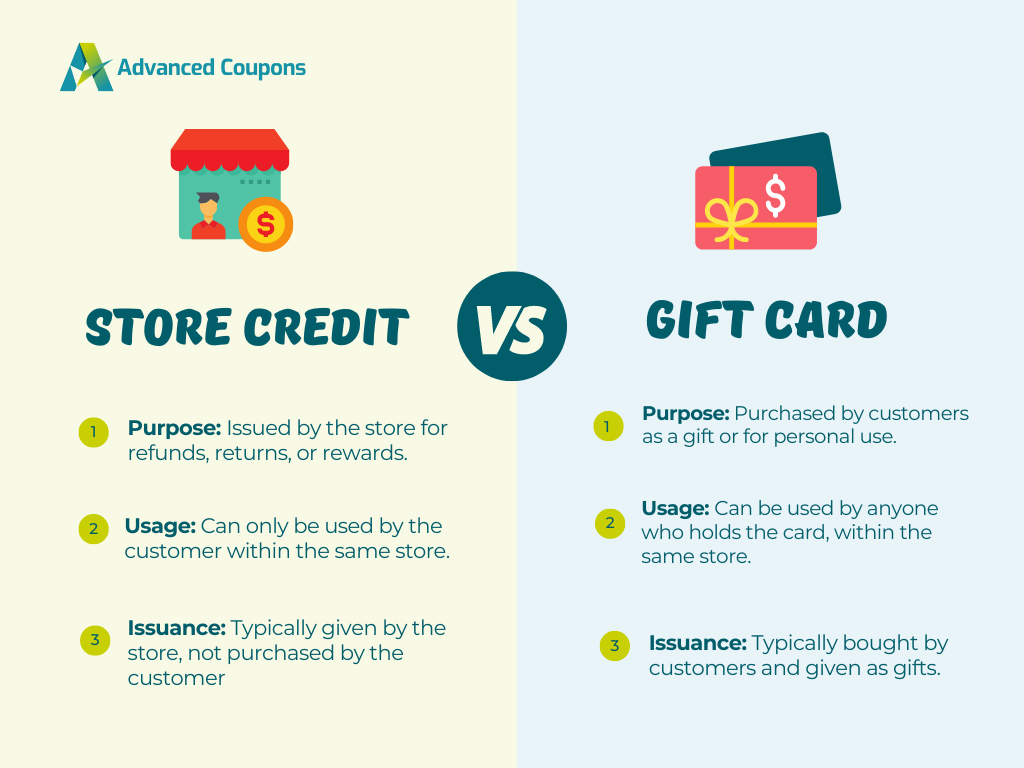
Store credit vs gift card: which is better for your e-commerce store? Both of these tools are powerful options for rewarding, engaging, and keeping your customers coming back. However, they offer distinct advantages and are commonly used in different scenarios. As an e-commerce store owner, it’s important to understand when and how to use them to improve your store’s performance.
This is exactly what we’ll get into today! In this guide, we’ll help you understand store credits and gift cards, so you’ll know exactly which option is best to offer in your store.
So, are you ready to learn? Then let’s get right into it!
TL;DR? Use this store credit vs gift card comparison table to see the key differences in how they are acquired, used, and managed at a glance.
| Feature | Store Credit | Gift Card |
| Primary Purpose | Customer retention and handling returns/refunds. | Gifting and new customer acquisition. |
| How it’s Acquired | Issued by the merchant to the customer’s account. | Purchased by a customer as a prepaid balance. |
| Transferability | Usually non-transferable; tied to a specific user account. | Transferable; can be sent to friends or family as a gift. |
| Primary Benefit | Keeps revenue within the store after a return. | Increases brand awareness and average order value. |
| Redemption | Often applied automatically at checkout for logged-in users. | Redeemed via a unique code during the checkout process. |
What Is Store Credit?
Store credit is a type of “currency” granted to customers by e-commerce store owners like you. Essentially, it’s a balance that customers can use to purchase items, and can only be used exclusively in your store. Often, store credits are issued as a way to handle returns and refunds, or to reward loyal customers. Let’s look into these common scenarios below:
Common uses of store credits
One key difference between store credit vs gift card lies in how they’re used. Typically, store credits are granted in the following scenarios:
- Returns and exchanges: Store owners often issue store credit as an alternative to refunds when customers return items. This is a smart way to keep the funds within your store and encourage customers to return for another purchase.
- Rewarding loyal customers: Loyalty programs are a tried and tested method to keep customers coming back. These programs often leverage store credits to reward customers for repeat purchases, motivating them to keep shopping and reach set spending thresholds. This works best when using tiered loyalty program levels, where the store credit rewards increase as customers reach higher spending thresholds.
- Addressing customer concerns: When customers have issues with their orders (such as delivery delays or order errors), business owners can issue store credits as a goodwill gesture to make things right.
Pros and cons of store credits
Pros
- Simplifies the refunds/returns process: With store credits, you eliminate the need for multiple payment transactions and make it easier for shoppers to purchase again.
- Reduces revenue loss: Essentially, by issuing store credits instead of refunds, you ensure that the funds stay in your business. You can even set percentage store credit limits to control exactly how much credit can be applied to a single order.
- Foster customer loyalty: Offering store credits as part of your loyalty program encourages customers to come back and shop again. Moreover, according to industry insights, shoppers who are part of a loyalty program are 59% more likely to choose a brand over a competitor.
Cons
- Limited use: Store credits can only be used in your store, which can make it less enticing for customers who prefer cash refunds.
- Complex tracking: Managing store credits can get cumbersome if you handle a lot of transactions within your e-commerce store.
What Is A Gift Card?

Gift cards are virtual or physical prepaid cards loaded with a specific monetary value that allows customers to purchase from your e-commerce store. Unlike store credits which are “issued” to customers as a reward or refund, gift cards are often purchased by customers themselves. It’s one of the most popular gifting options during holidays and special occasions.
Common uses of gift cards
- Boosting sales during holidays and special events: Gift cards are the go-to gifting choice for shoppers during birthdays, holidays, and other special occasions. In fact, according to industry estimates, more than 93% of shoppers have either given or sent a gift card in the past 12 months!
- Attracting new customers: When customers purchase a gift card from your store and gift it to someone, they’re essentially introducing your business to new customers. It’s one of the most powerful ways to increase your brand awareness and bring in new shoppers to your store.
- Rewarding customers: Offering gift cards as a reward for customers can help foster customer loyalty and encourage them to shop again. For example, you can offer them as a gift when customers unlock new spending tiers in your loyalty program.
Pros and cons of gift cards
Pros
- Increases brand awareness: Essentially, customers who purchase gift cards from your store and give them to friends and family act as brand ambassadors for your business, extending your brand’s reach.
- Convenient and flexible: Gift cards are a popular gifting option for a reason–they offer unparalleled convenience and flexibility, allowing recipients to choose their preferred products from your store.
- Boosts average order values: 61% of gift card recipients tend to spend over the value of their gift cards. This tendency increases your average order values, which is good news for your bottom line.
Cons
- Complex management: Running a gift card program can be challenging if you don’t have the right tool or system for it. It entails keeping track of balances, ensuring seamless redemption, and resolving concerns related to gift cards.
- Legal compliance: Different regions have varied regulations and requirements on gift card fees and expiration dates. It’s crucial to research and comply with these laws to avoid legal issues or customer concerns.
Store Credit Vs Gift Card
Here’s a simple infographic showcasing the main differences between store credit and gift cards:
How To Offer Store Credits And Gift Cards In WooCommerce
After moving through this store credit vs gift card guide, you’re probably keen on leveraging gift cards and store credit tools to grow your WooCommerce store. If you’re wondering how to set up store credit in WooCommerce, one of the easiest ways is by using the free Advanced Coupons plugin.
This plugin lets you grant, manage, and track store credit balances directly from your dashboard, making it simple to issue credits for refunds, loyalty rewards, or promos without any manual work! Here’s a quick overview:
Advanced Coupons (Free)

With our free Advanced Coupons plugin, you can extend the default WooCommerce coupon functionality and grant store credits to your customers.
To make managing even easier for you, this plugin provides a user-friendly store credit dashboard where you can track and manage your customers’ store credits. Administrators and shop managers can directly add, deduct, or adjust store credits from the dashboard, allowing you to fully control how you issue and use store credits.
WooCommerce Gift Cards
As we’ve discovered, offering gift cards in your store can help boost sales, increase brand awareness, and attract new customers to your business.
If you’re looking for the easiest way to create gift cards in WooCommerce, check out WooCommerce Gift Cards. With just a few clicks, you can offer customizable, digital gift cards right in your store. Choose from available templates or upload your own designs to tailor your gift cards for your brand. You can also enable the “giftable” option, allowing customers to purchase gift cards for others. It’s a powerful way to spread the word about your brand.
With this plugin, you also gain access to an exclusive gift card dashboard, giving you key insights on your gift card sales, top products, and so much more!
Frequently Asked Questions
Is a store credit the same as a gift card?
No, gift cards and store credits are not the same. Stores often issue credits to customers as a form of refund or reward, which they can only use within that store. In contrast, customers typically purchase gift cards for themselves or as gifts. These gift cards have a prepaid value that allows customers to purchase from the same store.
What is the point of a store credit card?
Stores often grant credits to customers for returns or refunds and use them to reward loyal customers. It keeps the revenue within the business, encouraging customers to shop in your store again.
How do I create gift cards in WooCommerce easily?
The easiest way to create gift cards in WooCommerce is by using the WooCommerce Gift Cards plugin. It’s designed for simplicity and ease of use. With this tool, you can quickly set up digital gift cards, customize designs, and enable gifting options right within your WooCommerce dashboard.
Conclusion
Understanding the difference between store credit and gift cards is crucial for ecommerce store owners. Both of these tools can help you grow your store and keep customers coming back, but in different ways. In this store credit vs gift card guide, we uncovered the following:
We also discussed their pros and cons, as well as how you can set them up in WooCommerce. With Advanced Coupons, you can easily grant store credits to customers and offer gift cards in your store.
Do you have any questions about this topic? Let us know in the comments!







Giving a gift card means giving the recipient the opportunity to choose what they need. Surely, the recipient will be happy to use it to buy any product or service in the corresponding store.